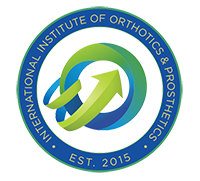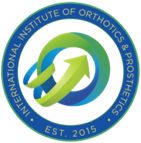Orthotics and Prosthetics Masters of Science Program Course of Instruction
Curriculum Description
The International Institute of Orthotics and Prosthetics, Orthotics and Prosthetics Masters of Science program develops a competent, confident, self-motivated Orthotists and Prosthetists with the ability to think critically and provide therapy effectively in a variety of client situations. Each student becomes fully prepared to enter the profession of an Orthotics and Prosthetist with a good foundation in therapy, knowledge, and skills. Students develop an attitude of caring while developing self-confidence in interacting with clients and other health care providers. They will learn to apply the techniques required of an Orthotist and Prosthetist in a purposeful and focused manner.
The curriculum includes a total of 49 credit-hours taken over four semesters. A credit hour is based on the number of classroom lecture hours per week throughout a term. Students are awarded credit for classes on the basis that a semester unit of credit is equal to a minimum of three hours of work per week (i.e. 1 credit hour equals 1 hour lecture plus 2 hours of homework OR 3 hours of lab) for a 16-week semester. Course work includes studies of the basic sciences, research as well as the physical and clinical sciences of orthotics and prosthetics. Course work is evaluated on the scale-graded grading system as identified in this catalog.
A Master of Science Degree is awarded upon completion of the 49 credit-hour curriculum of study. The following academic policies, regulations and procedures apply to all students at the International Institute of Orthotics and Prosthetics, Orthotics and Prosthetics Master’s of Science program. Failure to conform to policies, regulations and procedures may jeopardize or negate a student’s opportunity to pursue and/or complete the program of study leading to the Master of Science in Orthotics and Prosthetics degree.
The Master of Science Degree is required in order for the student to become eligible for licensure through the American Board for Certification in Orthotics, Prosthetics & Pedorthics (ABC). In addition to the Master of Science Degree, ABC certification also requires the student meet other eligibility rules which is not provided by the degree earned at the International Institute of Orthotics and Prosthetics. These requirements include completion of a National Commission on Orthotic and Prosthetic Education (NCOPE) accredited residency program. This is a 12-month program, per discipline, or an 18-month dual discipline program in which a resident is tracked through the program with specific clinical experience, research, and other requirements. Residents must successfully complete the residency program in order to meet the certification eligibility requirements. The student is encouraged to visit the ABC website (www.abcop.org) for further information.
Orthotics and Prosthetics Masters of Science Program Course of Instruction
The program is comprised of a 49 credit-hour curriculum spread across four semesters. All classes/laboratories must be attended, and all quizzes/tests passed to receive the Master’s of Science degree.
2023-2024 Academic Year
| 2023-2024 | |||||
|---|---|---|---|---|---|
| Course Number | Course Name | Credit Hours | Lecture Hours | Laboratory Hours | Clinic Hours |
| SEMESTER 1 | |||||
| HAP030L | Human Anatomy & Physiology | 3 | 32 | 48 | |
| INP030 | Introduction to Pathology | 3 | 48 | ||
| ACN030 | Applied Clinical Neuroanatomy | 3 | 48 | ||
| CGA030L | Clinical Gait Analysis | 3 | 32 | 48 | |
| SEMESTER 2 | |||||
| ISL010L | Introduction to Laboratory Skills and Materials in Prosthetics and Orthotics | 1 | 48 | ||
| CET010L | Clinical Evaluation Tools | 1 | 48 | ||
| OML140L | Orthotic Management of the Lower Limb 1 | 4 | 32 | 96 | |
| OMS030L | Orthotic Management of the Spine | 3 | 32 | 48 | |
| PML140L | Prosthetic Management of the Lower Limb 1 | 4 | 32 | 96 | |
| SEMESTER 3 | |||||
| OML240L | Orthotic Management of the Lower Limb 2 | 4 | 32 | 96 | |
| PML240L | Prosthetic Management of the Lower Limb 2 | 4 | 32 | 96 | |
| PMU030L | Prosthetic Management of the Upper Limb | 3 | 32 | 48 | |
| OMU030L | Orthotic Management of the Upper Limb | 3 | 32 | 48 | |
| CPS040L | Contemporary Practice and Synthesis | 4 | 48 | 48 | |
| CLR010 | Clinical Research | 1 | 48 | ||
| SEMESTER 4 | |||||
| CLR020 | Clinical Rotation | 2 | 0 | 200 | |
| MAP030 | Master's Project | 3 | 48 | ||
| Total Hours | 49 | 480 | 816 | 200 | |
2024-2025 Academic Year
| 2024-2025 | |||||
|---|---|---|---|---|---|
| Course Number | Course Name | Credit Hours | Lecture Hours | Laboratory Hours | Clinic Hours |
| SEMESTER 1 | |||||
| HAP030L | Human Anatomy & Physiology | 3 | 32 | 48 | 0 |
| INP030 | Introduction to Pathology | 3 | 48 | 0 | 0 |
| ACN030 | Applied Clinical Neuroanatomy | 3 | 48 | 0 | 0 |
| CGA030L | Clinical Gait Analysis | 3 | 32 | 48 | 0 |
| ILS010L | Introduction to Laboratory Skills and Materials in Prosthetics and Orthotics | 1 | 0 | 48 | 0 |
| CET010L | Clinical Evaluation Tools | 1 | 0 | 48 | 0 |
| SEMESTER 2 | |||||
| OMU030L | Orthotic Management of the Upper Limb | 3 | 32 | 48 | 0 |
| OMS030L | Orthotic Management of the Spine | 3 | 32 | 48 | 0 |
| OML140L | Orthotic Management of the Lower Limb 1 | 4 | 32 | 96 | 0 |
| PML140L | Prosthetic Management of the Lower Limb 1 | 4 | 32 | 96 | 0 |
| SEMESTER 3 | |||||
| OML240L | Orthotic Management of the Lower Limb 2 | 4 | 32 | 96 | 0 |
| PML240L | Prosthetic Management of the Lower Limb 2 | 4 | 32 | 96 | 0 |
| PMU030L | Prosthetic Management of the Upper Limb | 3 | 32 | 48 | 0 |
| CPS040L | Contemporary Practice and Synthesis | 4 | 48 | 48 | 0 |
| CLR010 | Clinical Research | 1 | 0 | 48 | 0 |
| SEMESTER 4 | |||||
| CLR020 | Clinical Rotation | 2 | 0 | 0 | 200 |
| MAP030 | Master's Project | 3 | 48 | 0 | 0 |
| Total Hours | 49 | 480 | 816 | 200 | |

